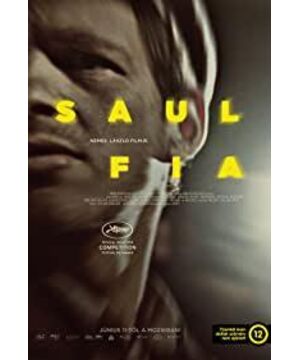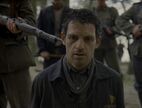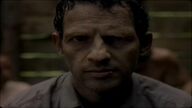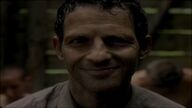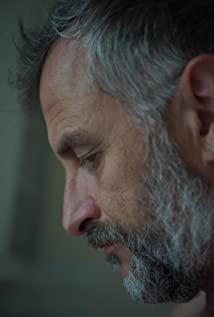The well-educated Jeles also learned from the film "The Man from London" by the great god Béla Tarr. He has been taught a lot and has mastered what is the true value of the film, the starting point Higher, will have certain expectations of him. The point is that with the increase in popularity, the audience will have a general understanding of this film, the background of World War II, the environment of the concentration camp, the victimized Jews, and everyone who was mobilized to be interested will be curious about what way or method Jelles would use. Dealing with a sensitive subject that is easy to get in trouble and preconceived, this is obviously a hot potato that many senior veterans dare not try easily, not to mention a newcomer in the film industry, plus there are many classic success precedents before. And Jeles did not copy the predecessor’s ideologically oriented, correct and supposedly shooting mode, but through a unique form, with an absolute single subject setting and an internal mental examination of the concept entered the year. That dark and tragic history.
This film completely abandons the rendering and accent of the soundtrack, and replaces it with real and direct sound effects, the miserable and tragic shouts of the suffering Jews, and the chaotic and decisive sound created by the rain of bullets. Jeles made use of many voice-overs to enrich it. In a restricted situation, the film soon staged a scene of sending a large number of Jews into the gas chamber. There were tragic and painful shouts and instinctive beatings from inside the door. Standing outside the door was a numb cable. Well, at that moment, it was enough to describe it as “starting first to be strong”, which strongly shocked the audience. The effect of the picture is indeed a texture that can only be reflected when using film, and a continuous expansion is wrapped in the regular frame ratio. The uncomfortable, dignified and deep tone of the film fits the theme of the film, making the whole film always indulged in a deep desperate intention. It may also be influenced by Tal, who is not cold at all or even a little resistant to digital. In order to inevitably interfere with the image itself due to the advanced technology of the film (funds are also limited), the audience's attention is focused on the plot itself and the historical background.
It was found in the gas chamber whether the boy who was finally killed in one breath was Sol’s son. The answer can be found from the clues (the dialogue between Sol and his companions) given in the later film. The main storyline of the film is around Sol. With an incomprehensible obsession, the process of burying his "son" with his whole heart and one mind is almost extreme. Everyone has their own views and understanding of Sol’s actions, and I see from Sol that he is purely an authority. From the point of view, the experience is more of a kind of self-paralysis after losing all hope. It is in a desperate situation where it is impossible to achieve complete loss of vitality, in a space filled with the smell of blood and death, borrowing From a reasonable emotional reason (the main link that maintains the development of human society, even if it may be the relationship that Sol’s wishful thinking), it catches a trace of "sacred mission and goal that can be completed within the power", and captures about living We have never experienced the meager perception, and we projected the past with realistic eyes. Perhaps Saul’s approach is absurd and stupid, but for him, it is the only authority he can violate in a few days. The ability to act out of self-will.
According to our established values and moral judgment standards, we will feel that the purpose of the detachment's actions is reasonable, but in this environment where humanity is gradually disappearing and dealing with death all day long, how can we face completely unreasonable cruel treatment? Is it possible to produce reasonable and optimistic results? As I wrote before, Thor’s driving force may make him feel the only breath and existence, and he can also feel his own potential role in this melting pot soaked with death breath, and he can find him from the Nazis. Breaking free from the murderous mechanical operation to have a short-term breathing opportunity, then why Sol doesn’t work hard for his companions, but drags them back, and Sol, who is basically indifferent, seems to be from a kind of darkness. The distorted paralyzed state was overwhelmed by another drive to be paralyzed by the self, and he did his best to complete the plan that he thought could also reflect the inner value of the silk. I remember that when Sol was sent to take the package by his companion in the film, he avoided it. The girl's active hands, he seems to be deliberately isolating and avoiding people (living), triggering more unnecessary movements and establishing too much emotional involvement.
He also knew in his heart that the goal of his companions to live and gain freedom was nothing more than a bubble-like hope for self-deception. The consequence of hitting a rock with a pebble would only be to meet the god of death in advance. Despair is unrealistic. It seems inspiring but essentially meaningless, because there is only one way before their eyes from the beginning to the end—death. In the end, Sol, who failed to "burial", is helped by his companions. Walking into the forest where they walked out of the blurry lens at the beginning, and seeing the child Sol, a rare smile appeared on the desperate face, with a profound meaning, as if they had harvested a moment of consolation in the boundless darkness. With the gunshots, the ending is clear to our hearts. The forest echoing back and forth is like a paradoxical and desperate reincarnation. Finally, the voice-over strikes, and the Nazis ruthlessly snatched their lives and announced the end of their lives. The sorrowful breath permeated, and the heavy aftertaste left after the shock lingered in my heart for a long time.
View more about Son of Saul reviews


